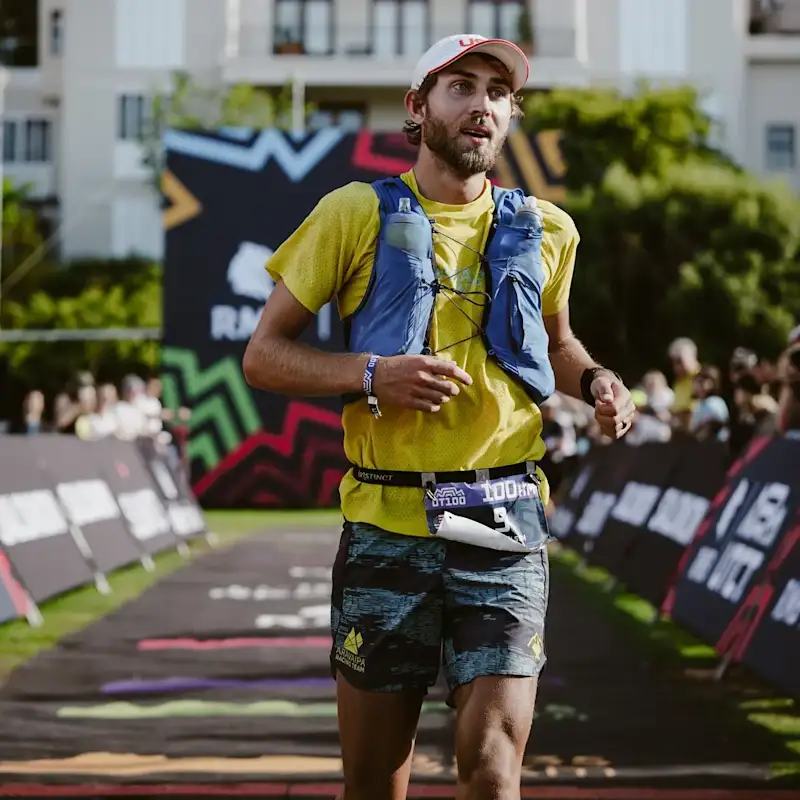
Caleb Olson
Arches Ultra 50km
Caleb's headline numbers
Caleb's strategy
Fueling
Carbohydrate is the main fuel you burn when racing. Failing to fuel properly is a leading cause of underperformance in longer races.
Caleb was aiming for the top end of the carb intake guidelines for a race of this duration and intensity, targeting ~90g per hour. By simply sipping on a PF 90 Gel every hour, along with a smaller caffeinated gel in the first hour, Caleb successfully executed the fueling strategy which he plans to use during longer, 10+ hour races, later in 2024. He had no GI issues whilst running at a slightly higher intensity than he initially planned, which bodes well for the longer, less intense races, where the amount of available blood flowing to his stomach will likely be greater, thus facilitating greater carb absorption.
Hydration
Taking on board an appropriate amount of fluid and sodium is essential to maintaining blood volume and supporting the cardiovascular effort needed to perform on race day.
Whilst the absolute amount of sodium and fluid consumed per hour is important, it’s critical to consider these in relation to each other. This is known as 'relative sodium concentration' and it’s expressed in milligrams per litre (mg/L). How much sodium you’re taking in per litre of fluid is more important than the absolute amount taken in per hour.
Caleb’s preloading protocol was almost spot on, but for warmer races, increasing the relative concentration of his morning electrolyte drink from ~1,000mg of sodium per litre to ~1,500mg/L will help him achieve the optimal physiological effects and prime his body. Whilst we don’t have any sweat sodium or sweat rate data for Caleb, his perception during the race of minimal sweat losses, along with no negative side-effects like muscle cramps or nausea is an indication that he was replacing his losses well enough for the cool conditions, with temperatures only peaking at ~8℃ (46℉). He wasn’t overly thirsty afterwards, but did take several hours to pee so was likely a bit down on fluids at the finish line which is to be expected. Undertaking some sweat rate testing will be vital to estimating his fluid losses in warmer climates, and help him avoid any performance decline associated with dehydration, particularly during longer events.
Caffeine
Beyond the Three Levers of Performance (carb, sodium and fluid), caffeine is one of only a few substances that is proven to improve performance for most endurance athletes as it can help stave off mental and physical fatigue.
Caleb has recently begun trialling the use of caffeine during races, but has previously experienced some negative effects of large doses in one go, so is sensibly playing it safe for now. For this reason, he chose to have a short coffee pre-race, and take a small caffeine dose (~40mg) in the first hour of the race. This was with the view to increasing the dose to within the scientifically optimal amount for endurance performance once he practises this extensively in training and other simulation races.
How Caleb hit his numbers
Here's everything that Caleb ate and drank on the day...
Caleb's weapons of choice
Final thoughts
Caleb's full stats
Data Confidence?
There is good confidence in the accuracy of the data reported. An athlete feels that the numbers closely reflect what they consumed despite a couple of estimations which may carry some degree of error. The majority of what was consumed is recorded to a high level of specificity (most volumes are known through the use of bottles brands quantities flavours). The numbers are very plausible and align with previous data recordings (if an athlete has collected data previously).